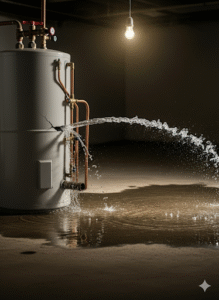Hot Water Cylinder Leaking?
Fast Repairs and Replacements in Auckland

A leaking hot water cylinder can quietly cause major damage to your home. It drives up your energy bills, ruins flooring, and often fails when you least expect it. At Hot Water Direct, we’ve helped thousands of Auckland homeowners deal with leaking water cylinders, whether it’s a slow drip from a valve or a sudden pool of water at the base of the tank.
Our licensed technicians understand how to quickly identify the source of the leak and recommend the most practical and cost-effective solution. Some problems are fixable. Worn valves, corroded fittings, or pressure relief faults can often be repaired. But when the cylinder itself starts leaking, particularly from the bottom, it usually signals internal corrosion. In those cases, full replacement is not just safer. It’s smarter long term.
Every situation is different. That’s why we offer no-obligation inspections and clear advice tailored to your system’s age, condition, and setup. Whether you have a low-pressure unit in an older home or a modern mains-pressure model, we’ll give you the right guidance.
What Causes a Hot Water Cylinder to Leak?
Leaks can show up in several ways, each pointing to a different cause. Water at the top of the cylinder often comes from loose joints, corroded pipes, or a malfunctioning temperature pressure relief valve. These are generally repairable by a qualified plumber.
On the other hand, water leaking from the bottom of the tank usually means the inner lining has failed. In these cases, the entire cylinder needs replacing to avoid ongoing water loss or a complete system breakdown. Ignoring these signs can lead to far more expensive water damage and a sudden loss of hot water when you need it most.
Do You Need a Repair or a Replacement? We’ll Give You the Right Answer
We don’t push for replacements unless it’s genuinely the best option. When we visit your property, we assess the cylinder’s condition, pressure setup, age (most last between 10 and 20 years), and the exact cause of the leak. If a reliable repair is possible, we’ll get it done. If not, we’ll guide you through your replacement options, including upgrading to more efficient models that better suit your household’s needs.
Prevent Future Leaks With Routine Maintenance
Hot water cylinders don’t last forever, but a little care can go a long way. Regular maintenance helps prevent common faults and gives you a heads-up before small problems turn into major repairs.
Our team recommends:
-
Flushing the tank every couple of years to remove sediment that can corrode the lining
-
Testing the pressure relief valve to ensure it’s working properly
-
Checking and replacing the anode rod, which protects the tank from internal rust
These small checks can extend the lifespan of your system and reduce the risk of unexpected leaks or failures.
Why Homeowners Across Auckland Trust Hot Water Direct
We’ve built our reputation by doing the job right the first time. Our customers choose us because we combine technical expertise with friendly, honest service. We don’t sell solutions you don’t need, and we always explain your options clearly.
Here’s what you can expect:
-
Prompt response for both urgent and non-urgent jobs
-
Fully qualified, experienced technicians who know the local systems
-
24/7 availability for emergency leaks
-
Free quotes with clear pricing and no hidden costs
-
Advice that puts your long-term interests first
We service homes all over Auckland and are proud to be a trusted name for hot water cylinder repair and replacement.
Frequently Asked Questions
Got questions about hot water cylinder leaks?
These issues are usually repairable. We’ll assess whether a replacement is necessary or if a quick repair can solve the problem.
Prices vary based on the model, size, and installation complexity. We offer transparent quotes, so you’ll know exactly what to expect before any work begins.
Yes. We provide 24-hour support throughout Auckland. Call us any time for urgent leaks or system failures.
Usually not. Leaks from the base of the cylinder often mean internal damage. In most cases, a full replacement is the safest option but let our team take a look and give you professional advice either way.
Contact Hot Water Direct
Talk to Auckland’s hot water experts today.
Looking for a free quote? Get in touch with us using the details below.



